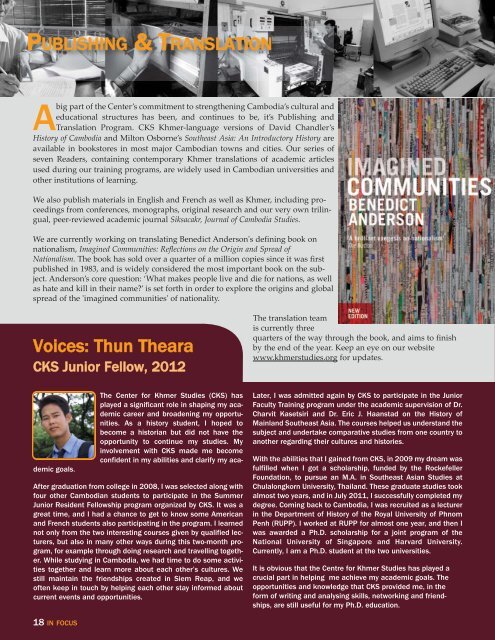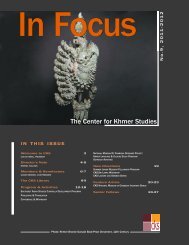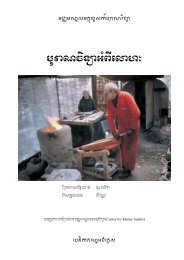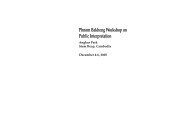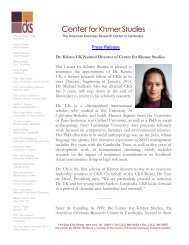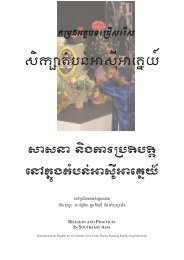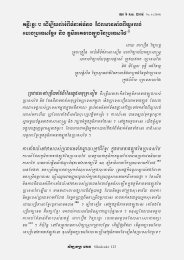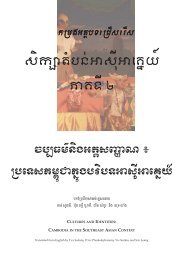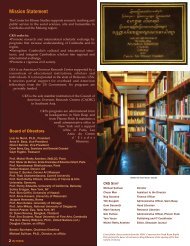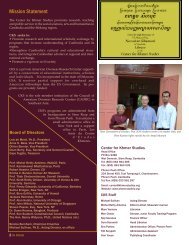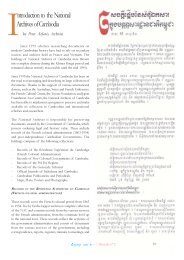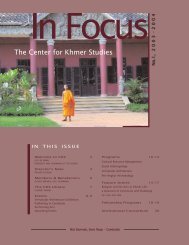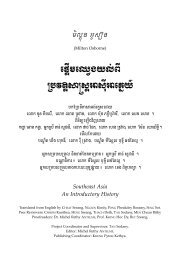You also want an ePaper? Increase the reach of your titles
YUMPU automatically turns print PDFs into web optimized ePapers that Google loves.
PUBLISHING & TRANSLATION<br />
Abig part of the <strong>Center</strong>’s commitment to strengthening Cambodia’s cultural and<br />
educational structures has been, and continues to be, it’s Publishing and<br />
Translation Program. CKS <strong>Khmer</strong>language versions of David Chandler’s<br />
History of Cambodia and Milton Osborne’s Southeast Asia: An Introductory History are<br />
available in bookstores in most major Cambodian towns and cities. Our series of<br />
seven Readers, containing contemporary <strong>Khmer</strong> translations of academic articles<br />
used during our training programs, are widely used in Cambodian universities and<br />
other institutions of learning.<br />
We also publish materials in English and French as well as <strong>Khmer</strong>, including proceedings<br />
from conferences, monographs, original research and our very own trilingual,<br />
peerreviewed academic journal Siksacakr, Journal of Cambodia <strong>Studies</strong>.<br />
We are currently working on translating Benedict Andersonʹs defining book on<br />
nationalism, Imagined Communities: Reflections on the Origin and Spread of<br />
Nationalism. The book has sold over a quarter of a million copies since it was first<br />
published in 1983, and is widely considered the most important book on the subject.<br />
Anderson’s core question: ‘What makes people live and die <strong>for</strong> nations, as well<br />
as hate and kill in their name?’ is set <strong>for</strong>th in order to explore the origins and global<br />
spread of the ʹimagined communitiesʹ of nationality.<br />
Voices: Thun Theara<br />
CKS Junior Fellow, <strong>2012</strong><br />
The translation team<br />
is currently three<br />
quarters of the way through the book, and aims to finish<br />
by the end of the year. Keep an eye on our website<br />
www.khmerstudies.org <strong>for</strong> updates.<br />
The <strong>Center</strong> <strong>for</strong> <strong>Khmer</strong> <strong>Studies</strong> (CKS) has<br />
played a significant role in shaping my academic<br />
career and broadening my opportunities.<br />
As a history student, I hoped to<br />
become a historian but did not have the<br />
opportunity to continue my studies. My<br />
involvement with CKS made me become<br />
confident in my abilities and clarify my academic<br />
goals.<br />
After graduation from college in 2008, I was selected along with<br />
four other Cambodian students to participate in the Summer<br />
Junior Resident Fellowship program organized by CKS. It was a<br />
great time, and I had a chance to get to know some American<br />
and French students also participating in the program. I learned<br />
not only from the two interesting courses given by qualified lecturers,<br />
but also in many other ways during this two-month program,<br />
<strong>for</strong> example through doing research and travelling together.<br />
While studying in Cambodia, we had time to do some activities<br />
together and learn more about each other’s cultures. We<br />
still maintain the friendships created in Siem Reap, and we<br />
often keep in touch by helping each other stay in<strong>for</strong>med about<br />
current events and opportunities.<br />
Later, I was admitted again by CKS to participate in the Junior<br />
Faculty Training program under the academic supervision of Dr.<br />
Charvit Kasetsiri and Dr. Eric J. Haanstad on the History of<br />
Mainland Southeast Asia. The courses helped us understand the<br />
subject and undertake comparative studies from one country to<br />
another regarding their cultures and histories.<br />
With the abilities that I gained from CKS, in 2009 my dream was<br />
fulfilled when I got a scholarship, funded by the Rockefeller<br />
Foundation, to pursue an M.A. in Southeast Asian <strong>Studies</strong> at<br />
Chulalongkorn University, Thailand. These graduate studies took<br />
almost two years, and in July 2011, I successfully completed my<br />
degree. Coming back to Cambodia, I was recruited as a lecturer<br />
in the Department of History of the Royal University of Phnom<br />
Penh (RUPP). I worked at RUPP <strong>for</strong> almost one year, and then I<br />
was awarded a Ph.D. scholarship <strong>for</strong> a joint program of the<br />
National University of Singapore and Harvard University.<br />
Currently, I am a Ph.D. student at the two universities.<br />
It is obvious that the Centre <strong>for</strong> <strong>Khmer</strong> <strong>Studies</strong> has played a<br />
crucial part in helping me achieve my academic goals. The<br />
opportunities and knowledge that CKS provided me, in the<br />
<strong>for</strong>m of writing and analysing skills, networking and friendships,<br />
are still useful <strong>for</strong> my Ph.D. education.<br />
18 IN FOCUS


